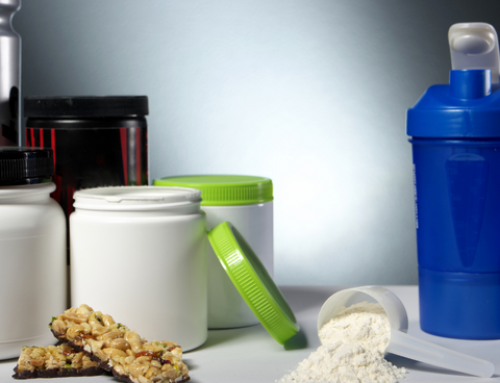Creatine Supplements: Benefits, Concerns, Types and Dosage
Creatine is one of the most popular supplements among athletes. Why? It is one of the few supplements that has been scientifically proven to safely build muscle, boost endurance and increase overall strength. (See Athletic Performance Benefits of Creatine.)
Creatine is a naturally occurring substance that is composed of three amino acids: L-methionine, glycine and L-arginine. It is naturally broken down in the liver and stored in skeletal muscle, where it is used as an energy source for maximum efforts of strength, power or speed lasting up to six seconds. (Read about How to Take Creatine as an Athlete.)
Benefits
Strength: Several studies have suggested that strength gains are linked to creatine supplementation. A study from 2000, conducted at Southern Illinois University, revealed that experienced lifters who supplemented with creatine achieved greater arm strength than the control group. [1]
Energy Production: Creatine improves your capacity to perform at maximal intensity as it increases your muscles’ stores of phosphocreatine. This enhances your ability to produce energy following repeated bouts of maximal intensity, leading to more quality reps during a workout. [2,4]
Lean Body Mass: In conjunction with electrolyte enriched sports drinks, creatine has been proven to promote gains in lean body mass, resistance training volume, sprinting and agility performance in Division I college football players. [4]
Injury Prevention: Another study involving Division I college football players found that creatine supplementation reduces the incidence and severity of injuries and cramping ailments. [3]
Common Concerns
Creatine usage has prompted a number of concerns, typically mired in uninformed speculation. Research has suggested that creatine does not affect the kidneys, liver or digestive tracts of healthy individuals. It does not pose risks similar to those associated with illicit performance enhancing drugs, such as anabolic steroids or peptide hormones. [3] (See Is Creatine Safe and Effective for Young Athletes?)
Types of Creatine
The shelves of your local sports nutrition store are stocked with a number of different brands and types of creatine supplements, which are sold in serum, pill or powdered form. The most common are:
Creatine Monohydrate: linked with a single water molecule so it can be easily mixed into a liquid for consumption.
Creatine Ethyl Ester: dissolves better in phospholipids and fats, presumably making it active for a longer period. It’s commonly sold in pill or serum form as it does not mix well in water-based beverages.
Creatine Citrate: like creatine monohydrate, it rapidly dissolves in water-based beverages. Its structure is derived from the binding of creatine molecules with citric acid.
Creatine Nitrate: like monohydrate and citrate, this type is highly water soluble. Its structure is derived from the binding of creatine molecules with a nitrate group.
Creatine Phosphate: is water-soluble and is derived from the combination of creatine and a phosphate molecule.
Of the different forms mentioned above, creatine monohydrate is the most popular and typically the least expensive.
Usage and Dosage
All athletes can use creatine, provided they do not have a preexisting medical condition. Individuals participating in strength or endurance training activities may want to consider supplementing with creatine to give their training a boost.
Research has indicated that it’s best to take five grams per day. As a frame of reference, five grams is the equivalent of a heaping teaspoon. (Read the YOU Docs: Q&A on Creatine.)
Beginning users commonly “load” or mega-dose for a period of one to two weeks, theoretically boosting their body’s phosphocreatine stores. This practice should only be followed if the directions on the supplement explicitly indicate loading. Otherwise, loading may be a waste of the supplement and your money.
Creatine does increase water retention, thus increasing your weight. Athletes who participate in weight class sports—such as wrestlers, MMA fighters, powerlifters and weightlifters—may want to discontinue usage before competition.
Sources
[1] Becque MD, Lochmann JD, Melrose DR. “Effects of oral creatine supplementation on muscular strength and body composition.” Med Sci Sports Exerc. 2000.
RECOMMENDED FOR YOU
Creatine Supplements: Benefits, Concerns, Types and Dosage
Creatine is one of the most popular supplements among athletes. Why? It is one of the few supplements that has been scientifically proven to safely build muscle, boost endurance and increase overall strength. (See Athletic Performance Benefits of Creatine.)
Creatine is a naturally occurring substance that is composed of three amino acids: L-methionine, glycine and L-arginine. It is naturally broken down in the liver and stored in skeletal muscle, where it is used as an energy source for maximum efforts of strength, power or speed lasting up to six seconds. (Read about How to Take Creatine as an Athlete.)
Benefits
Strength: Several studies have suggested that strength gains are linked to creatine supplementation. A study from 2000, conducted at Southern Illinois University, revealed that experienced lifters who supplemented with creatine achieved greater arm strength than the control group. [1]
Energy Production: Creatine improves your capacity to perform at maximal intensity as it increases your muscles’ stores of phosphocreatine. This enhances your ability to produce energy following repeated bouts of maximal intensity, leading to more quality reps during a workout. [2,4]
Lean Body Mass: In conjunction with electrolyte enriched sports drinks, creatine has been proven to promote gains in lean body mass, resistance training volume, sprinting and agility performance in Division I college football players. [4]
Injury Prevention: Another study involving Division I college football players found that creatine supplementation reduces the incidence and severity of injuries and cramping ailments. [3]
Common Concerns
Creatine usage has prompted a number of concerns, typically mired in uninformed speculation. Research has suggested that creatine does not affect the kidneys, liver or digestive tracts of healthy individuals. It does not pose risks similar to those associated with illicit performance enhancing drugs, such as anabolic steroids or peptide hormones. [3] (See Is Creatine Safe and Effective for Young Athletes?)
Types of Creatine
The shelves of your local sports nutrition store are stocked with a number of different brands and types of creatine supplements, which are sold in serum, pill or powdered form. The most common are:
Creatine Monohydrate: linked with a single water molecule so it can be easily mixed into a liquid for consumption.
Creatine Ethyl Ester: dissolves better in phospholipids and fats, presumably making it active for a longer period. It’s commonly sold in pill or serum form as it does not mix well in water-based beverages.
Creatine Citrate: like creatine monohydrate, it rapidly dissolves in water-based beverages. Its structure is derived from the binding of creatine molecules with citric acid.
Creatine Nitrate: like monohydrate and citrate, this type is highly water soluble. Its structure is derived from the binding of creatine molecules with a nitrate group.
Creatine Phosphate: is water-soluble and is derived from the combination of creatine and a phosphate molecule.
Of the different forms mentioned above, creatine monohydrate is the most popular and typically the least expensive.
Usage and Dosage
All athletes can use creatine, provided they do not have a preexisting medical condition. Individuals participating in strength or endurance training activities may want to consider supplementing with creatine to give their training a boost.
Research has indicated that it’s best to take five grams per day. As a frame of reference, five grams is the equivalent of a heaping teaspoon. (Read the YOU Docs: Q&A on Creatine.)
Beginning users commonly “load” or mega-dose for a period of one to two weeks, theoretically boosting their body’s phosphocreatine stores. This practice should only be followed if the directions on the supplement explicitly indicate loading. Otherwise, loading may be a waste of the supplement and your money.
Creatine does increase water retention, thus increasing your weight. Athletes who participate in weight class sports—such as wrestlers, MMA fighters, powerlifters and weightlifters—may want to discontinue usage before competition.
Sources
[1] Becque MD, Lochmann JD, Melrose DR. “Effects of oral creatine supplementation on muscular strength and body composition.” Med Sci Sports Exerc. 2000. [2] Cooper R, Naclerio F, Allgrove J, et al. “Creatine supplementation with specific view to exercise/sports performance: and update.” J Int Soc Sports Nutr. 2012. [3] Kreider RB. “Long-term creatine supplementation does not significantly affect clinical markers of health in athletes.” Mol Cell Biochem. 2003. [4] Kreider RB, Ferreira M, Wilson M, et al. “Effects of creatine supplementation on body composition, strength, and sprint performance.” Med Sci Sports Exerc. 1998.











